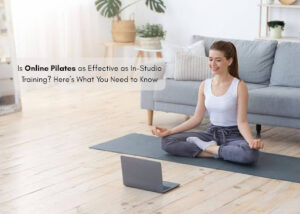
If you’ve been scrolling through Instagram at 11 PM, watching Pilates instructors flow through graceful movements, you’ve probably wondered: Should I invest in a studio membership or just roll out my mat at home? It’s a question many of us grapple with, especially when our schedules are packed and our wallets are feeling the pinch.
The truth is, both online Pilates and studio sessions have their place in your fitness routine. The key is understanding which one aligns with your current fitness level, goals, and lifestyle. Let’s break it down, shall we?
The Real Difference Between Online and Studio Pilates
When you walk into a Pilates studio, there’s an undeniable energy. The instructor sees you, adjusts your alignment, and catches that slight arch in your lower back before it becomes a problem. That hands-on correction? It’s gold, especially when you’re starting out.
Online Pilates, on the other hand, offers something studios can’t always provide: the freedom to practice at 6 AM in your pajamas or squeeze in a session during your lunch break. No commute, no fixed schedule, and honestly, no judgment if you pause mid-plank to check on the dal simmering on the stove.
But here’s where it gets interesting. The effectiveness of your Pilates practice doesn’t solely depend on whether you’re in a studio or at home. It depends on you, your experience level, your body awareness, and your ability to stay disciplined when Netflix is just one click away.
Walk into a pilates studio and you’ll feel something shift. An instructor watches your every move, adjusts your hip alignment, catches that subtle arch in your lower back before you even realize you’re compensating. That hands-on correction becomes invaluable, especially during your first few months when you’re still learning what “neutral pelvis” actually means in your body.
Studio pilates offers immediate feedback. Your instructor sees when your shoulders creep toward your ears during a roll-up. You get verbal cues plus physical adjustments that help your nervous system understand the movement pattern faster.
Online Pilates operates differently. You practice in your own space, on your own mat, following an instructor through a screen. But here’s where many people get confused: not all online Pilates works the same way. Pre-recorded videos you can play whenever you want offer convenience but zero personalized feedback. Live, scheduled sessions with a dedicated instructor bridge the gap between convenience and quality instruction.
The effectiveness of your practice depends less on location and more on structure, accountability, and whether you receive real-time guidance while you move.
Comparing Your Options: A Practical Look
| Factor | Studio Pilates | Online Pilates (Live Scheduled Sessions) |
| Form Correction | Physical adjustments and verbal cues during movement | Real-time visual assessment and verbal corrections through dual-angle viewing |
| Equipment Access | Reformers, cadillacs, chairs, and specialized apparatus available | Mat-based work with props like balls, bands, and blocks |
| Accountability | Fixed schedule and group energy create commitment | Scheduled appointments with instructor waiting for you |
| Investment | Higher cost due to studio overhead and equipment | More budget-friendly with private instruction included |
| Flexibility | Requires commute and fixed timing | Scheduled sessions from your space, eliminating travel time |
| Personalization | Private sessions offer tailored attention | One-on-one format ensures customized guidance throughout |
When Studio Pilates Makes More Sense
If you’re brand new to Pilates, a studio setting gives you something invaluable: a learning foundation. Those first few months are when you’re building your movement vocabulary, understanding what “neutral spine” actually feels like, and figuring out why everyone keeps talking about breathing.
Studio Pilates works best if you:
- Need hands-on guidance to master the basics and avoid compensatory movement patterns
- Have an injury or chronic condition that requires expert supervision and modifications
- Get motivated by the energy of group classes and in-person accountability
- Want access to equipment like the reformer or trapeze table that enhances your workout variety
- Prefer keeping your home space separate from your fitness routine to maintain focus
iKore Pilates, led by master educator Dr. Deepali Gupta, specializes in providing this kind of foundational training. With locations in Aundh and Hinjewadi, the studio offers both in-person sessions and teacher training programs that go deep into movement principles and anatomy. The hands-on approach means you’re not just going through motions, you’re understanding the why behind each movement.
Read About: Pilates Instructor Online: Guide to Virtual Pilates Training
When Online Pilates Is Your Perfect Match
Here’s where online Pilates shines: you’ve got the basics down, you know when your form is off, and you need flexibility more than anything else. Maybe you’re juggling work deadlines, family commitments, or a commute that eats half your day. Online training removes all those barriers.
Online Pilates works best if you:
- Already have a solid understanding of Pilates principles and can self-correct your form
- Need the flexibility to fit workouts around unpredictable schedules or early morning/late evening preferences
- Want to manage your fitness budget more effectively without compromising on quality instruction
- Value the privacy and comfort of practicing at home
- Want variety in your routine with access to different instructors and class styles not available locally
iKore Pilates offers Pilates 3-D, addressing the biggest concern people have about online training: proper form correction. Here’s how the program works differently from generic online classes.
You schedule private, one-on-one sessions with certified instructors at fixed appointment times. Before your session begins, you set up two devices, one positioned for a front view, one for a side angle. Your instructor watches both angles simultaneously during your entire practice.
While you move through each exercise, your instructor observes your alignment from multiple perspectives, catching compensatory patterns you might miss. “Engage deeper through your lower abdominals.” “Lengthen your spine as you roll down.” “Keep your shoulders away from your ears.” Precise corrections happen in real-time, helping your nervous system integrate proper movement patterns.
The dual-device setup means your instructor sees what would be visible in a studio setting. No guessing whether your pelvis stays neutral during leg circles. No wondering if your spine articulates fully during a roll-up. Your instructor tracks every detail and guides you verbally throughout the session.
Sessions happen at scheduled times, creating the same accountability as studio classes. Your instructor waits for you at your appointed time. You can’t skip easily when someone expects your presence. Consistency builds results, and structure builds consistency.
Whether you’re a beginner starting your Pilates practice, a fitness enthusiast looking to add variety, or someone in rehabilitation needing guided movement, the program adapts to your current level. You get the personalized attention of private studio sessions from your own space.
The Hybrid Approach: Getting the Best of Both
Here’s something worth considering: you don’t have to choose just one. Many practitioners find that combining occasional studio sessions with regular online practice creates the ideal balance. Maybe you attend studio classes once or twice a month for form checks and equipment work, while maintaining your routine with online sessions throughout the week.
This hybrid model gives you the accountability and specialized attention of studio Pilates while maintaining the convenience and affordability of online training. It’s particularly effective once you’ve built a strong foundation and just need periodic check-ins to ensure you’re progressing safely.
Making Your Decision
Think about where you are right now. If you’re completely new to Pilates, investing in studio sessions, even just for the first few months, can set you up for long-term success. Places like iKore Pilates offer introductory packages that make this initial investment more manageable, including specialized programs in movement principles and anatomy that give you a deeper understanding of your body.
If you’ve been practicing for a while and know the difference between a roll-up and a roll-over, online training can keep your practice alive without the logistical challenges. The key is honesty: can you maintain form without someone watching? Will you actually press play when your bed looks really comfortable?
For those dealing with injuries or chronic conditions, studio training isn’t just better, it’s safer. Online modifications are helpful, but they can’t replace an experienced instructor who can see exactly how your body is compensating and adjust accordingly.
What About Cost and Accessibility?
Let’s talk money. Studio Pilates costs more, plain and simple. But that cost brings value: equipment you wouldn’t have at home, expert instruction, and a dedicated space that helps you show up consistently. Many studios, including iKore Pilates, offer package deals and memberships that bring down the per-class cost.
Online Pilates platforms are kinder to your budget, with monthly subscriptions that cost less than a single studio class. For young professionals building their careers, this affordability can mean the difference between maintaining a regular practice or dropping fitness altogether.
Accessibility matters too. If you live in an area where commuting to a quality Pilates studio takes an hour, or if your work schedule makes fixed class times impossible, online training isn’t just convenient, it’s the only realistic option.
The Bottom Line
Both online and studio Pilates can be effective. The right choice depends on your experience, goals, budget, and lifestyle. Beginners and those recovering from injuries benefit most from the personalized attention of studio training. Experienced practitioners with good body awareness can achieve excellent results with online sessions, especially when they need flexibility and affordability.
At iKore Pilates, the focus is on meeting people where they are. Whether that’s in the studio in Pune or through their online education programs, the goal remains the same: helping you build strength, flexibility, and body awareness through proper Pilates practice.
Your fitness routine should fit your life, not the other way around. Choose the option that you’ll stick with, because consistency always beats perfection.
Frequently Asked Questions
Q. Can beginners start with online Pilates or should they go to a studio first?
Ans. While beginners can start with online Pilates, studio sessions offer crucial form corrections that prevent injury and build proper technique. If you choose online, look for beginner-specific classes that break down movements slowly and consider supplementing with occasional studio visits for form checks.
Q. How much does studio Pilates cost compared to online classes?
Ans. Studio Pilates typically costs more due to equipment and overhead, with single classes ranging from several hundred rupees to over a thousand. Online subscriptions and programs are more affordable, often costing a fraction of studio memberships, making Pilates accessible to more people.
Q. Do I need special equipment for online Pilates?
Ans. For online Pilates, you primarily need a mat and a comfortable space. While props like resistance bands, blocks, and small balls enhance variety, mat-based Pilates effectively builds core strength and flexibility. iKore Pilates offers programs that work with minimal equipment, making home practice accessible.
Q. Can online Pilates help with injury recovery?
Ans. Online Pilates can support recovery for those with existing Pilates experience and body awareness, but it’s not recommended for acute injuries or rehabilitation without prior studio training. An instructor’s real-time supervision ensures safe modifications that online platforms can’t provide, making studio sessions safer for recovery.
Q. What qualifications should I look for in a Pilates instructor?
Ans. Look for instructors with comprehensive certification from recognized programs that cover anatomy, movement principles, and teaching methodology. At iKore Pilates, Dr. Deepali Gupta leads teacher training programs that emphasize anatomical understanding and proper form, ensuring instructors can guide students safely whether online or in-studio.
